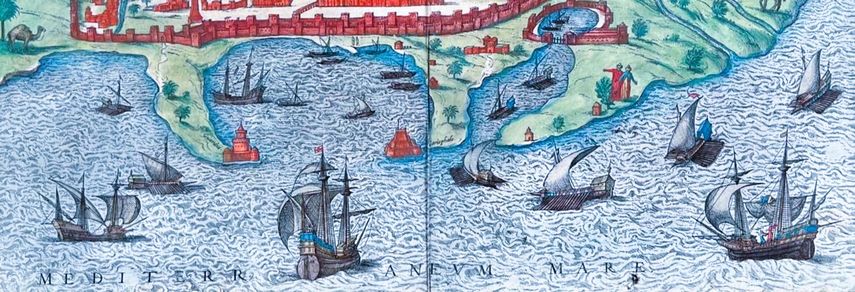NEWS & CALLS
The Necropolis as Memoryscape: Open Call for Participants

Alexandria, Egypt; 15-24 September 2024
An on-site Workshop in the framework of the international research program “Funerary art in the Eastern Mediterranean (4th c. - 1st c. BCE): old connections and new beginnings”
Overview
Memoryscapes are immersive, multi-sensorial landscapes inviting their visitors to remember their individual or collective history within a space physically occupied by memorials and monuments. Actively redeploying architectural and sculptural materialities, cemeteries inscribe their visitors with stories and memories authored and edited by the communities that produced them. This is most evident in societies in flux, such as Alexandria in the 4th-1st c. BCE, when cemeteries – what the Greeks themselves called necropoleis, that is “cities of the dead” – were organized and designed as ideological powerhouses of and for the community, meant to commemorate the dead whilst educating the living. One particular aspect of this Workshop will be to investigate the influence cemeteries exercise on future generations as cohesive devices for the life of the community: from commemorating the dead to propagating social norms and values (as in the case of the Early and Mid-Hellenistic cemeteries of Alexandria, mostly populated by naturalized immigrants) or to forging discourses of localized and globalized identities – ethnic, social, religious or other.
This Workshop, scheduled to run for ten days (15-24 September 2024; days to be confirmed), will investigate mortuary practices, strategies of personhood and selfhood, as well as memory narratives in Hellenistic Alexandria and its reception in later eras. Bringing together senior and junior scholars, from different countries and disciplines, the Workshop will aim to discuss funerary art under the light of recent theoretical breakthroughs in the study of the ancient world.
Structure
The Workshop will consist of ten days of lectures, seminars, and on-site classes; provisional fieldtrips include: Ptolemaic/Roman cemetery sites in Alexandria (Shatby; Mustafa Kemal; Anfushi); On-site class at the Greco-Roman Museum; Bibliotheca Alexandrina and museum.
Towards the end of the Workshop, each junior participant will be required to offer a 20’ paper on his or her research, as part of a junior colloquium.
Who may apply
We invite applications from post-graduate and doctoral archaeology and art-history students, recent PhDs and young faculty members (within eight years from obtaining their degree) registered at or having graduated from a university based in the Eastern Mediterranean region. Applicants (who must be fluent in English) should submit a personal statement of up to 1000 words detailing their research, as well as their reasons for wishing to attend (we expect their research to be related to the theme of the Workshop); a recent cv (single page); a copy of their most recent degree in archaeology, art history or a related discipline; and an abstract of up to 500 words of the specific paper they wish to present at the colloquium (last day of the Workshop). Applicants must be able to demonstrate an academic and/or professional engagement with archaeology of the Hellenistic period, as well as an active interest in the archaeological theory and practice of at least parts of the Eastern Mediterranean basin. Successful applicants will be expected to attend all lectures, seminars, group discussions, on-site classes, and any other Workshop meeting or event, as well as present a 20’-paper of their own at the junior scholars’ colloquium. It is hoped that these papers will eventually lead to publishable academic articles or significant portions of the participants’ PhD theses.
Participants in the September 2024 Workshop will be offered a place in the Program’s two subsequent Workshops (2025: Cyprus; 2026: Alexandrian environs).
Who are we
This Workshop is organized in the framework of an international research Program on Ptolemaic art and archaeology, under the general title “Funerary art in the Eastern Mediterranean (4th c. - 1st c. BCE): old connections and new beginnings”, funded by the Getty Foundation as part of its Connecting Art Histories initiative and hosted by the National and Kapodistrian University of Athens (Department of History and Archaeology) in collaboration with the Archaeological Society of Alexandria and the Bibliotheca Alexandrina.
Our Program aims to bring together scholars – academic researchers and field operatives alike, both of an already established stage as well as early- and mid-career professionals – from a wide range of institutions and different countries; our goal is to study antique funerary art (burial edifices and the painting and sculpture associated with them), and its various modes of reception and study (academic or aesthetic) by the multifaceted, multicultural, and often deeply divided contemporary world of the Eastern Mediterranean. In short, we wish to examine how funerary art reflects on mortuary habits on the one hand, and religious beliefs and social norms on the other.
The Program is directed by Professor Dimitris Plantzos (National and Kapodistrian University of Athens) and Professor Mona Haggag (Archaeological Society of Alexandria).
Funding
The Workshop is fully funded; successful applicants will have their airfare and accommodation covered by the Program and will receive a reasonable per-diem compensation (up to ten days).
What to do and when
Prospective applicants should send their queries and application materials to Professor Nikolas Dimakis (Program Coordinator): nikdimakis[at]arch.uoa[dot]gr, by May 15, 2024. Successful applicants will be notified by mid-to-late June.
Link: See here for more information.

Support for this Program is provided by the Getty Foundation as part of its Connecting Art Histories initiative.
